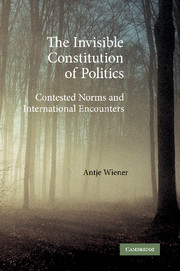Book contents
- Frontmatter
- Contents
- List of tables and graphs
- Preface
- 1 Introduction
- Part I Three theoretical moves
- 2 Constitutionalism beyond modernity
- 3 The dual quality of norms
- 4 Making normative meaning accountable for international relations
- Part II Case study: reconstructing the structure of meaning-in-use
- Part III Evaluation
- Annex
- References
- Index
2 - Constitutionalism beyond modernity
Published online by Cambridge University Press: 22 September 2009
- Frontmatter
- Contents
- List of tables and graphs
- Preface
- 1 Introduction
- Part I Three theoretical moves
- 2 Constitutionalism beyond modernity
- 3 The dual quality of norms
- 4 Making normative meaning accountable for international relations
- Part II Case study: reconstructing the structure of meaning-in-use
- Part III Evaluation
- Annex
- References
- Index
Summary
Constitutionalism is,… but a prism through which one can observe a landscape in a certain way, an academic artefact with which one can organize the milestones and landmarks within the landscape…, an intellectual construct by which one can assign meaning to, or even constitute, that which is observed.
(Weiler 1999: 223; my emphasis)Introduction: emerging constitutional quality in a global context
When speaking of a constitution, we mean a set of norms, principles and provisions and the mandate to organise the political (Snyder 1990; Preuss 1994; Rosenfeld 1994). In distinction from other agreements such as conventions or treaties, constitutions are expected to offer a ‘civilised’ and ‘embedded’ approach to settling conflicts while respecting the constituents’ wishes and ways of life. Constitutions relate to a set of cultural and social conditions within specific contexts, and they represent an agreement (written or not) among representatives of the governed within a community to make sure that the governors proceed according to the wishes of the former (Tully 1995; Walker 2002; Maduro 2003). While this type of agreement has had a long-standing role in domestic politics in Europe starting with the Greek city-states, a similar constitutional quality has emerged only much more recently in international politics.
- Type
- Chapter
- Information
- The Invisible Constitution of PoliticsContested Norms and International Encounters, pp. 21 - 36Publisher: Cambridge University PressPrint publication year: 2008

